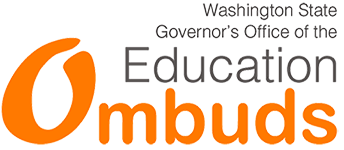Parent Observations in the Classroom
Family and school collaboration is key to supporting student success. To work together well, families and teachers both need information about the child, and the child’s learning environment. One way families can get a picture of where and how a child is learning, is to observe in the classroom.
Do parents have a right to observe their child’s classroom?
Washington state law, at RCW 28A.605.020, requires each school district to adopt a policy to assure parents access to their child’s classroom and/or school sponsored activities for the purposes of observing class procedure, teaching material and class conduct.
The same law makes clear, however, that such observation shall not disrupt the classroom procedure or learning activity.[1] This means that districts need to have a policy, but there might be some circumstances where families cannot observe the classroom.
What do District policies say about classroom observations?
Each school district’s policy may be a little bit different. Be sure to ask for a copy of your district’s policy and procedure if you are thinking about observing your child’s class.
Many districts have developed policies and procedures that require families to work with the principal and teacher to plan a time for the observation.
To make sure that classrooms are not disrupted and schools are safe, schools often do not allow parents to just “drop in” to a classroom without planning in advance with the teacher.
When Planning an Observation, be ready to:
- Schedule the observation in advance;
- Be joined by an administrator while you observe;
- Watch, jot down questions, but wait to ask your questions at another time; and
- Plan for a time to talk with the teacher sometime after the observation.
Ask for your school district’s policy and procedure on classroom visits (including a translation or interpretation if needed).
What about any rights from federal laws? Like ESSA? Or Special Education Laws?
Do they give parents the right to observe classrooms?
For families with children in “Title I” schools:
ESSA (Every Student Succeeds Act):
In order to facilitate shared responsibility for high academic achievement, ESSA requires schools receiving support under Title I to develop school-parent compacts that include:
- Plans to ensure reasonable access to staff,
- Opportunities to volunteer and participate in the child's class and
- Observation of classroom activities.
Section 1116(d)(2)(C).[2] If your child attends a Title I school, ask about the school-parent compact. If you are able, try to find out how you can get involved in developing the compact. That compact will likely include the same requirement for scheduling visits in advance to minimize disruption and ensure school safety.
For families with children receiving special education through an IEP:
IDEA (Individuals with Disabilities Education Act):
The IDEA places an emphasis on parent participation and requires that schools and parents work as teams to make decisions about children’s goals, placement, and services. That law does not give parents a specific right or entitlement to observe their children in the classroom. However, IEPs are built on school and parent collaboration. The U.S. Department of Education’s Office of Special Education Programs encourages schools and parents to work together to meet their mutual needs to support students, including offering opportunities for observation. >Letter to Mamas, May 26, 2004, OSEP Policy Letter.
How do schools protect confidentiality for other students when a parent observes?
FERPA, the Family Educational Rights and Privacy Act, protects the confidentiality of student records. Teachers can take steps to ensure confidentiality, such as removing paper and electronic records from view; putting away IEPs and report cards; and avoiding sharing information about other students when talking about the observation with the parents.
What about observations in a special education classroom?
Some families have shared that they have experienced different responses to requests to observe in a special education classroom than in a general education classroom. There is nothing in the laws that would require a different policy or practice regarding observations in a special education classroom. Confidentiality concerns for student records and information in them apply equally to all students.
If you have additional questions, or want to troubleshoot challenges, you can contact OEO:
1-866-297-2597 or oeoinfo@gov.wa.gov.
[1] Find Washington State laws online at https://app.leg.wa.gov/rcw/: and RCW 28A.605.020 at: https://app.leg.wa.gov/rcw/default.aspx?cite=28A.605.020.
[2] Find a copy of ESSA online: https://www.ed.gov/laws-and-policy/laws-preschool-grade-12-education/every-student-succeeds-act-essa
